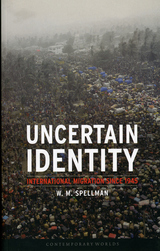3 books about Spellman, W. M.

A Brief History of Death
W. M. Spellman
Reaktion Books, 2014
As humans, death—its certainty, its inevitability—consumes us. We make it the subject of our literature, our art, our philosophy, and our religion. Our feelings and attitudes toward our mortality and its possible afterlives have evolved greatly from the early days of mankind. Collecting these views in this topical and instructive book, W. M. Spellman considers death and dying from every angle in the Western tradition, exploring how humans understand and come to terms with the end of life.
Using the work of archaeologists and paleoanthropologists, Spellman examines how interpreting physical remains gives us insight into prehistoric perspectives on death. He traces how humans have died over the centuries, both in the causes of death and in the views of actions that lead to death. He spotlights the great philosophical and scientific traditions of the West, which did not believe in an afterlife or see the purpose of bereavement, while also casting new light on the major religious beliefs that emerged in the ancient world, particularly the centuries-long development of Christianity. He delves into three approaches to the meaning of death—the negation of life, continuity in another form, and agnosticism—from both religious and secular-scientific perspectives.
Providing a deeper context for contemporary debates over end-of-life issues and the tension between longevity and quality of life, A Brief History of Death is an illuminating look at the complex ways humans face death and the dying.
Using the work of archaeologists and paleoanthropologists, Spellman examines how interpreting physical remains gives us insight into prehistoric perspectives on death. He traces how humans have died over the centuries, both in the causes of death and in the views of actions that lead to death. He spotlights the great philosophical and scientific traditions of the West, which did not believe in an afterlife or see the purpose of bereavement, while also casting new light on the major religious beliefs that emerged in the ancient world, particularly the centuries-long development of Christianity. He delves into three approaches to the meaning of death—the negation of life, continuity in another form, and agnosticism—from both religious and secular-scientific perspectives.
Providing a deeper context for contemporary debates over end-of-life issues and the tension between longevity and quality of life, A Brief History of Death is an illuminating look at the complex ways humans face death and the dying.
[more]

Monarchies 1000-2000
W. M. Spellman
Reaktion Books, 2001
Monarchies 1000 –2000 surveys a form of government whose legitimacy rests not on voluntary consensus but on age-old custom, heredity and/or religious sanction. Global in scope and comparative in approach, W. M. Spellman's survey establishes connections between monarchy as idea and practice in a variety of historical and cultural contexts across a millennium when the system was without serious rival.
Spellman examines the intellectual assumptions behind different models of monarchy, tracing the ways in which each of these assumptions shifted in response to historical factors. While no human institution has retreated as rapidly in the modern period, monarchy's remarkable longevity invites us to weigh the significance of hierarchy, subordination and dependence as constants of the human experience.
Spellman examines the intellectual assumptions behind different models of monarchy, tracing the ways in which each of these assumptions shifted in response to historical factors. While no human institution has retreated as rapidly in the modern period, monarchy's remarkable longevity invites us to weigh the significance of hierarchy, subordination and dependence as constants of the human experience.
[more]

Uncertain Identity
International Migration since 1945
William M. Spellman
Reaktion Books, 2008
Globalization is the defining phenomenon of the twenty-first century and migration is the cornerstone of its economic and social force. Uncertain Identity examines international movements of peoples over the past sixty years to show what migration patterns have meant to the economic and social systems of countries around the world.
W. M. Spellman chronicles how after 1945, migration patterns expanded in numbers of people and origin countries, due to overpopulation, poverty, violent conflicts, and the lowered costs of air travel. Uncertain Identity sets these patterns in the context of issues such as the impact of voluntary and forced relocation on the migrants and destination countries, the significance of south-to-north migrations, and recent enactments of restrictive immigration measures in developed nations. Spellman also considers temporary and refugee migrations and the ways in which refugees maintain cultural traditions despite their new environments.
An incisive study with global breadth, Uncertain Identity offers invaluable analysis for specialists in political science, sociology, and economics.
[more]
READERS
Browse our collection.
PUBLISHERS
See BiblioVault's publisher services.
STUDENT SERVICES
Files for college accessibility offices.
UChicago Accessibility Resources
home | accessibility | search | about | contact us
BiblioVault ® 2001 - 2024
The University of Chicago Press









